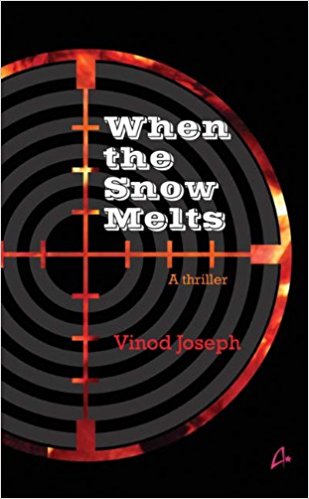Vinod Joseph writes well, with a crisp, clear, no nonsense style. He writes with a bravado, typical of the new generation of young writers, who don’t need publicity to feel that they can succeed. The novel is a thriller, where the protagonist, a man called Ritwick is an espionage agent, who is, (like penny pulp fiction writers intend,) immediately accessible to the imagination. He is always dressed simply, picked up by Al Qaeda thugs, interrogated by them quite dreadfully and then plays his double hand of professional treachery in espionage, which has fortuitously, all the terrorists killed or imprisoned by the end of the book. But the key protagonists are also a mixed bunch, so Al Qaeda is only one aspect of the group, among them are the Taliban and the ISI, where Pakistan’s diplomatic moves are hindered by the working of this dissolute Indian agent working for the British, who is kept from drinking his Old Monk whiskey for two weeks while in confinement. Since protagonist and author are not to be confused, the prose is lucid, and the author is able to bring to us the complex fictional sense of being an Indian in UK, where working for Intelligence Assesment Group (IAG) in London provides him with a gut sense of manoeuvring murderers in a bedroom, with his own guile and spittle. Of course, there is a woman from Lahore, in a burkha, whom the agent falls in love with, but that too is part of the plot which cannot be given away, as the fast pace of the thriller depends on the smug quality of foreknowledge which the author has, and the reader does not.
August 2013, volume 37, No 8


Wow, superb weblog layout! How long have you been running a blog for?
you made running a blog look easy. The total glance
of your website is magnificent, let alone the content
material! You can see similar here sklep internetowy
Definitely believe that which you said. Your favorite justification appeared to be on the internet the easiest
thing to be aware of. I say to you, I definitely get irked while people consider worries that
they just do not know about. You managed to hit the nail upon the top and also defined out the whole
thing without having side-effects , people can take a signal.
Will likely be back to get more. Thanks I saw
similar here: Dobry sklep
A person essentially lend a hand to make significantly posts I’d state. This is the very first time I frequented your web page and so far? I surprised with the research you made to create this particular submit extraordinary. Magnificent job!
Hello there! Do you know if they make any plugins to assist with Search
Engine Optimization? I’m trying to get my blog to rank for some targeted keywords but I’m not seeing very good success.
If you know of any please share. Appreciate it! You can read similar article here:
Najlepszy sklep
It’s very interesting! If you need help, look here: ARA Agency